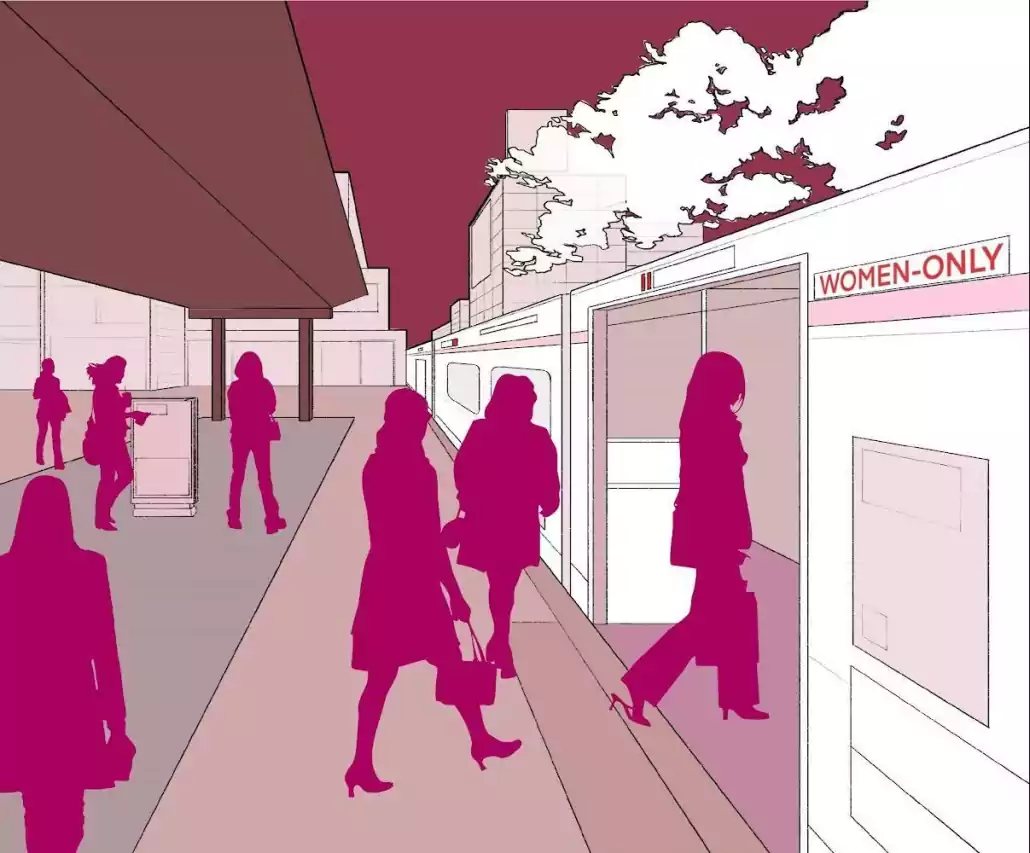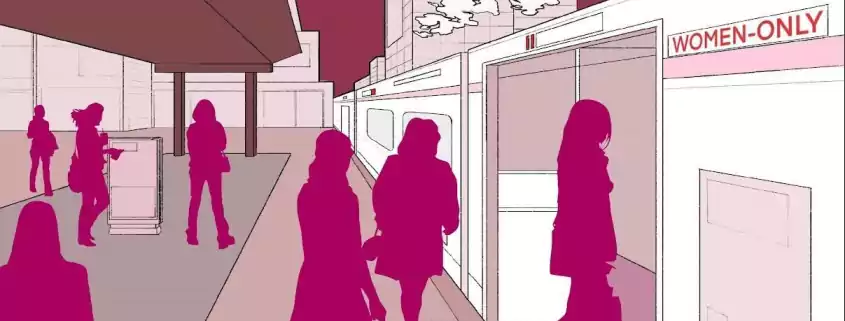Now boarding! The women’s safety express
By EMILY PHALLY
in Opinion
Now boarding! The women’s safety express
Japan’s approach to safety on public transportation should serve as an example.
By EMILY PHALLY

(Isabella Chae / Daily Trojan)
If you’re in Tokyo, you’ll likely spend the majority of your time on a train — traveling to Shibuya, Harajuku or Shinagawa using the JR East Yamanote Line.
Public transportation can take you nearly anywhere you desire as they’re timely, clean and — most importantly — have adequate measures to ensure everyone’s safety. Not to mention, the way Japanese railway companies and police have responded to accommodate a growing demand for women’s safety on trains is something Los Angeles needs to take note of.
Daily headlines, sent straight to your inbox.
Subscribe to our newsletter to keep up with the latest at and around USC.
What left the biggest impression on me as a young female tourist was Japan’s women-only train cars. A pink sign on the platforms in both English and Japanese indicates which train cars are reserved for women, specifying the days and hours when the service is effective.
Despite the deep-rooted issue of public groping toward women in Japan, referred to as “chikan,” this service is still new.
The first introduction of train cars exclusively for women dates back to 1912 with the Tokyo Chuo line and other areas such as Kobe but was later replaced with priority seating near train exits — similar to the United States’ form of accessibility seating — for older adults, small children and people who are injured or pregnant.
However, in 2004, there were a record number of sexual harassment complaints in Tokyo — an astonishing 2,201 recorded incidents. To grasp the extremity of the issue, Tokyo Metropolitan Police and JR Railway Company conducted a survey and found that two-thirds of women aged 20 to 40 reported incidents of groping. Railway companies then took action on this issue, reinstituting the women-only train cars. Starting in 2005, most Tokyo trains provided women-only carriages during rush hour. Most notably, the Keio Line and JR East offered women-only train cars during rush hours and late evening hours on express trains. Currently, there are women-only train cars on 87 lines for 32 railway companies.
The history and development of these dedicated carriages, which spanned nearly a century, show a determined effort to provide women with a safe and comfortable travel experience that effectively serves women riders. Approximately 70% of Japanese women support women-only train cars, according to a 2018 Reuters survey. L.A. public transportation companies must take note of Japan’s example and consider implementing similar safety measures in their public transportation systems. Because of riders’ primary concerns of crime, sexual harassment and safety, there has been a decrease in ridership of women on the L.A. Metro buses and trains from 2020 to 2022.
L.A. Metro needs to first recreate trust and reliability with women to ensure they are using the metro enough to implement new measures. The Osaka Midosuji subway is a great example of how to take appropriate action based on consumers’ concerns: The subway line saw remarkable success with women-only carriages, with complaints dropping by a third within a single year. As a result, the effective hours of the women-only train cars extended to the entire day, not just during peak hours.
L.A. Metro should follow suit, as the accessibility and inclusivity of public transportation — as well as the experience of those who are economically reliant on the service — are at risk. While it may take time to implement such changes, the impact on women’s lives and overall societal well-being is immeasurable.
It’s important to note the L.A. Metro is making great efforts to make people feel safer. The company intends to spend $290.5 million of its $9 billion budget for the 2023 fiscal year on the development of a multi-layered public safety approach as well as investing in improved security cameras, fare gates, lighting and other security infrastructure. However, physical enforcement and security control fail to address consumers’ needs, especially women riders, for an emotionally safe commuting experience.
Lastly, remember as consumers that these initiatives alone are not guaranteed to end harassment or have a drastic decrease in safety concerns at the beginning of their implementation. Institutional change is also required to make a noticeable difference.
L.A. Metro, faced with declining ridership due to concerns about safety and harassment, should learn from Japan’s journey and work toward creating a safer public transportation experience for women. Japan’s mass implementation of women-only train cars demonstrates an adequate step toward making public transportation a safe and inclusive space for all.
DONATION PLUG – PLEASE DO NOT TOUCH
Thank you for reading the Daily Trojan.
We are the only independent newspaper here at USC, run at every level by students. That means we aren’t tied down by any other interests but those of readers like you: the students, faculty, staff and South Central residents that together make up the USC community.
Independence is a double-edged sword: We have a unique lens into the University’s actions and policies, and can hold powerful figures accountable when others cannot. But that also means our budget is severely limited. We’re already spread thin as we compensate the writers, photographers, artists, designers and editors whose incredible work you see in our daily paper; as we work to revamp and expand our digital presence, we now have additional staff making podcasts, videos, webpages, our first ever magazine and social media content, who are at risk of being unable to receive the support they deserve.
We are therefore indebted to readers like you, who, by supporting us, help keep our paper daily (we are the only remaining college paper on the West Coast that prints every single weekday), independent, free and widely accessible.
Please consider supporting us. Even $1 goes a long way in supporting our work; if you are able, you can also support us with monthly, or even annual, donations. Thank you.









